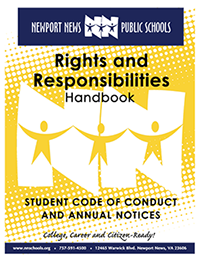Dr. Shayla Woodard
Program Administrator
Student Conduct and Discipline

NNPS Cell Phone Policy
In order to comply with state law, starting November 5, 2025, Newport News Public Schools students will not be allowed to use cell phones from the start of the school day to the end of the day, including during lunch and transition periods between classes.
NNPS supports cell phone-free education by ensuring that the use of cell phones and personal electronic communication devices does not interfere with teaching and learning or with maintaining a safe and orderly environment during the school day. Our policy restricts the use of cell phones and personal electronic devices from the opening bell to dismissal bell in elementary, middle and high schools.
The difference from last year’s policy will be that high school students will not be allowed to use their cell phones during their lunch periods. The policy will be enforced at all schools within the division.
Students must keep phones off and put away from the first bell to the last, with exceptions only for medical needs or emergencies. The goal is to reduce distractions, improve academic focus, encourage positive social interaction, and create a safer school environment.
Elementary students with cell phones should keep them off, and out of sight, during regular school hours and during after-school activities. Middle and high school students are permitted to have and use cell phones or two-way communication devices after school dismissal on school board property.
Consequences for students who violate the cell phone policy will follow the NNPS Student Code of Conduct and may include warnings, parent contact or disciplinary action. Repeated violations may result in a level 2 disciplinary response.
Basic Definitions
“Cell Phone” means a personal device capable of making calls, transmitting pictures or video, or sending or receiving messages through electronic means. The definition of cell phone is inclusive of a non-smartphone that is limited to making phone calls or text messages, a smartphone that encompasses the above features, and other future personal electronic communication devices with the above-mentioned characteristics.
"Personal Electronic Communication Devices" means any personal device capable of connecting to a smartphone, the internet, or a cellular or Wi-Fi network. Personal electronic communication devices may include wearable devices such as smartwatches, as well as personal headphones, earbuds, laptops, tablets, and other future electronic communication devices with the above-mentioned characteristics.







